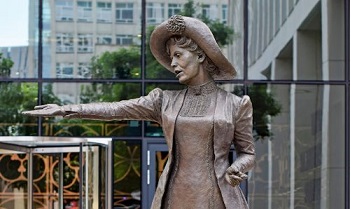2024 is a special year for The University of Manchester as we celebrate our 200th anniversary! This amazing milestone gives us an opportunity to reflect on all of the amazing and inspiring individuals who have made Manchester what we are today.
That’s why we’re delighted to share this series of blog posts written by our students – sharing the stories of individuals who inspire them from Manchester’s past and present.
In this post, second year student Aminat, shares why she is personally inspired by the life of Emmeline Pankhurst.
Emmeline Pankhurst (1858 – 1928)
by Aminat, Law with Politics, Year 2

A figure from Manchester’s history that inspires me is Emmeline Pankhurst, a British political activist who spearheaded the UK suffragette movement and helped women obtain the right to vote. Raised in Manchester, Emmeline was a pillar of the suffragette movement, and she is recognised by a statue in St Peter’s Square, in the heart of Manchester.
Like many suffragettes, her dedication to her cause led to Emmeline’s arrest on numerous occasions. However, I don’t believe this diminishes her accomplishments and achievements. In 1889, Emmeline founded the Women’s Franchise League, which secured the right for married women to vote for local offices. During this time, the idea of women’s suffrage was quite controversial and met with many objections. Her gender limited her the opportunity to work in organisations such as the Independent Labour Party, however she was able to channel this frustration into her other roles. Such as her work as a Poor Law Guardian, which exposed her to the harsh conditions within Manchester’s workhouses. Her work throughout her career has been inspiring to me and exceptionally impactful for people today.
In her pursuit of women’s suffrage, Emmeline faced both criticism and praise for her acts of civil disobedience. After her husband’s death she established the Women’s Social and Political Union (WSPU) in Manchester in 1903. The WSPU organised protests and published an official newspaper, the aptly titled ‘Votes for Women’. An example of this was 26 June 1908 – the day that 500,000 demonstrators rallied in Hyde Park.
From my own perspective, I feel that her efforts to achieve women’s suffrage are incredibly motivating for modern day feminists and her work continued to influence many other laws and policies that have come to pass. Including the Representation of People Act of 1928, which was passed a few weeks after her death. One of my favourite quotes from Emmeline is, “we are here, not because we are law-breakers; we are here in our efforts to become law-makers”. Not only does this quote describe how women were ultimately at a disadvantage regardless of their social status, it also describes how women can change the narrative and create their own movement for equality.
Emmeline’s statue situated in the city centre of Manchester, is a daily reminder of how much she sacrificed and endured for the rights of women. This statute is symbolic of why we should continue to fight for our rights of education, fair pay and equality in all aspects of life.
